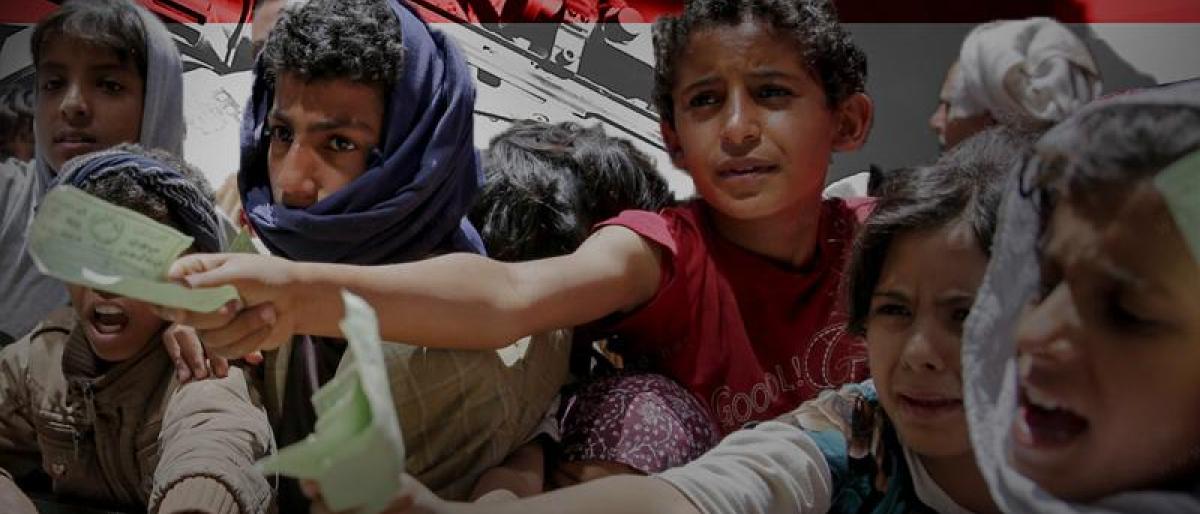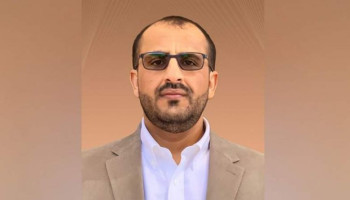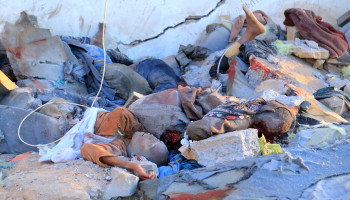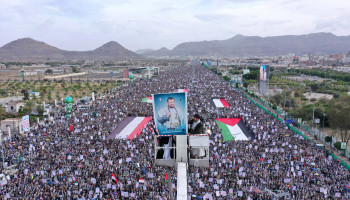A lengthy report by the Middle East Eye website published, Monday, talks about the step taken by the United Nations to reduce food aid in Yemen and the negative effects of this decision on the besieged country, whose residents suffer from the scourge of war waged by the Saudi-led coalition for the sixth year in a row.
The report highlighted a number of residents in the capital, Sana'a, who described their suffering.
“It is very difficult to face two disasters at once," Ahmed al-Matari, a Sana'a labourer said, as Yemenis in the war-torn country braced for a likely spread of the novel coronavirus.
"We have been thinking how to face the shortage of food aid and we may not find enough food, but to hear that coronavirus has hit Yemen, that's very difficult."
Yemen reported its first coronavirus case on Friday in a country where war has already shattered the health system and spread hunger and disease.
As a precautionary measure, schools and universities had already been closed last month, while a campaign of awareness over the virus was launched and movements between liberated and occupied areas were halted.
The appearance of the virus in the war-torn country is the latest blow to the country following an announcement from the World Food Programme (WFP) on Thursday that later this week it will halve the aid it gives to people in liberated parts of Yemen.
Regarding coronavirus Al-Matari noted that, “If organisations reduce their aid in normal days, we can work and pay for the most important food," he said.
“But if they are going to reduce food amid the coronavirus, we will starve to death in our houses.”
Al-Matari, who is in his late 40s, said it was impossible for him to stay at home if authorities asked him to, as he has no sources of income except from working and the humanitarian aid.
“Corona is a big threat and it came at the wrong time," he said.
"In this situation we need organisations to double their assistance as they will be the only resource of food, but unluckily they will instead reduce their aid.
“I hope that my message reaches organisations and authorities to solve their disputes and double their work in the coming months.
“If we have enough food we can stay at home and protect ourselves from corona but if we do not have enough we will go out to look for food."
The report said that out of 30.5 million Yemenis, 24 million are in need of some kind of humanitarian assistance. One of the biggest fears regarding the coronavirus threat is how the country's already weakened population, may of them solely reliant on WFP aid, will respond.
“After five years of war, people across the country have some of the lowest levels of immunity and highest levels of acute vulnerability in the world,” said Lise Grande, the UN humanitarian coordinator in Yemen.
“What’s facing Yemen is frightening. More people who become infected are likely to become severely ill than anywhere else.
“Only half of all health facilities are currently functioning. Fighting the virus is going to be hard, but it’s our highest priority.”
Among the most vulnerable people to the virus at this time are the displaced families who have fled their homes over the years of fighting, with many of them now living in makeshift camps which struggle to provide basic services.
“We received [coronavirus] awareness from some aid workers and they stressed hand washing but in this camp we do not have water to wash our hands several times a day,” Ali Tallal, who has been displaced from Hodeidah to Sanaa, said.
The 39-year-old lives in a camp on the outskirts of the capital where they bring water from a mosque, and where aid organisations also sometimes provide them with water.
“Instead of the awareness we need organisations to fill the water tank in the camp on a daily basis and then we can wash our hands and stay safe,” he said.
In a press release on 10 April, the day the first case of the coronavirus was announced, Mercy Corps, an international organisation operating in Yemen, urged donors to act to help the situation
“We’re calling on donors to provide the direct, flexible and long-term support that humanitarian organisations need to help communities protect themselves against Covid-19, improve the health system’s ability to respond, and protect against further economic collapse,” the US-based organisation said.
Fadhl Mohammed, a professor of sociology in Taiz, said the coming period will be very difficult so the authorities and organisations need to work together to help Yemenis.
“The economic situation is very difficult and many people can’t buy food, water or even soap, so the suffering in Yemen will be the worst," he said.
“In Europe, Covid-19 is killing thousands and they have good health systems, and people can buy food and stay at home, but in Yemen most Yemenis can’t stock-up food for a week.”
Source: al-masirah.net .







